
Business cycle refers to the movements or fluctuations in the economic activities such as trade and production. The movements can be upward or downward; that is, there are periods of expansion and contraction in the levels of economic activity. Thus, there is a wave-like pattern in the business cycle. It expands, and leads to a peak and then it contracts and leads to a trough. Thus, the business cycle consists of four phases. Peak is the point of high activity and trough is the point of low activity. It can be well represented by the following diagram.

Today’s quiz is related to the expansion phase. Expansion phase includes recovery and prosperity. During the recovery period, the economy recovers itself; the existing opportunities are expanded and new created; various improvements are made to improve the economy.
Thus, about the future of the economic growth and development there is an ever-increasing optimism during the recovery period.
This optimism is manifested in investing the capital in industries and machineries, employing more labor, and in the need of wanting more materials to facilitate this. All related industries are equally expanded. For example, with the expansion of automobiles industries, other industries of glass, steel, and rubber etc. are also expanded. Moreover, cement and machinery industries are also expanded because more roads are needed for automobiles. This demand for labor and material results in the prosperity of workers and the suppliers. This prosperity period may continue to rise until it reaches a peak, and this ends the expansion phase.
Below are given four statements. Your task is to identify the statement that best illustrates the optimism mentioned in the bold-faced sentence as being part of the expansion phase.
- Innovative businesses replace antiquated businesses with the advancement in technology
- The prices of agricultural commodities are increased at the producer level.
- Public funds are spent on the constructions of new highways and museums to stimulate tourism.
- Textile industries allocate money for the purchase of sewing machines, fabrics and other products for example large circular knitting.
All SBD made from this post will be awarded to the participant who chooses the correct answer at the end of the payout period. If there are more than 1 winners, the SBD will be awarded to the one who gave the best explanation of why they choose that answer.
Rules
- Upvote and resteem this post because it will be verified that the winner has upvoted and resteemed this post before sending the award.
- Leave your answer in the comments and explain why did you choose this answer.
I choose Number one, "Innovative businesses replace antiquated businesses with the advancement in technology..." because it definitely has some more meaning in this modern world than say, the other three do. The other three are either bold, or wouldn't stimulate the economy enough to get it fluctuating enough for the people to prosper and be happy.
Why? Because innovative businesses create optimism and capital is raised for new projects, technology, machinery, etc. People soon realize that this change is going to happen and they 1. gain the necessary skills to become a part of the labor pool that understands how to use the new technology, 2. invest what they can in the new technology or 3. do both. These activities create optimism and it builds until the expansion of the economy and the use of the new technology are fully realized...then the contraction begins.
Just a side note...antiquated businesses that realize the change is occurring will create new business units to absorb and adopt the new innovative technology so that they can continue to compete. This often creates growing pains and only the most adaptive organizations will survive.
Nice contest!
I will ponder my choice for a while and later either reply to this post or make a new reply with my choice and my reasoning behind it.
Nice contast
Public funds are spent on the constructions of new highways and museums to stimulate tourism.
1."Innovative businesses replace antiquated businesses with the advancement in technology" - because innovation and technology have already established themselves as growth catalysts. New businesses that want to succed need an advantage in order to be competitive with established businesses that already have market share; when the business is innovative enough it can even open up a whole new market where it could reap all the benefits of being first to market.
upvoted/resteemed @jero1
4. Textile industries allocate money for the purchase of sewing machines, fabrics and other products for example large circular knitting.
I chose this because it signifies that the textile industries are experiencing more demand on their product, meaning economic growth of the end consumer. By purchasing more sewing machins they are also stimulating the growth of the factories making them, which in turn grow the microchip industry and the needle industry etc. Thus expansion being seen all around.
Edit: The first statement in my opinion is misleading, as mass adoption of certain technology means that the old ones have already become obsolete. It also implies flooding the market and lowering prices thus, meaning that a peak has been reached and a drop is soon to occur due to oversupply.
I say number 4 because with rising demand comes the need for investment
I think it is the first thing that should change. The mentality and bad foundation should be replaced with inovation and fresh mentality.
Always we need to remember the past, but we must live in the present and use current tools to achieve quicker and better same results.
Hi @ilvstranger please resteem this post as well because it is one of the conditions to be considered for this contest.
i did it at the comment time, it doesn't let me do it again :(
I choose number 4-
"Textile industries allocate money for the purchase of sewing machines, fabrics and other products for example large circular knitting."
Simply because in your example of the automotive industry, when sales are up more is needed from other industries related to the auto sales, hence the relation between textile industry and the need for machines, fabric, etc to make the textile industry continue creating the product(s).
I think both 1 and 3 illustrate optimism during a recovery period. Both propel expansion and demand for more labor and but, I'll stay with #3 since investment in infrastructure will have a broader impact on the demand for labor and raw material.